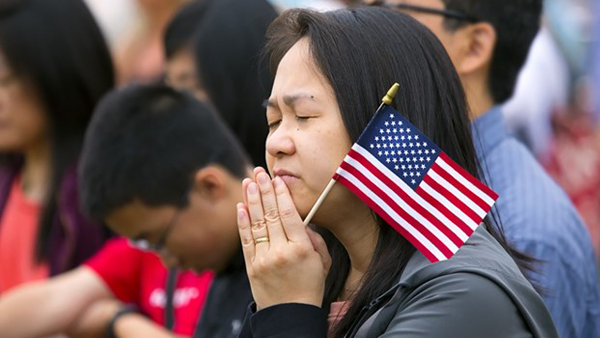By Ambassador Callista L. Gingrich
The annual observance of Religious Freedom Week will take place June 22-29 with the theme “Called to the Fullness of Dignity.” Beginning with the feast day of Saints Thomas More and John Fisher and ending on the feast of Saints Peter and Paul, the United States Conference of Catholic Bishops encourages the faithful to participate in prayer, reflection, and action to advance religious liberty in the United States and around the world.
Each day highlights a different topic related to threats against religious freedom, beginning with Respect for Sacred Spaces on June 22.
In recent years, there have been more than 400 attacks against Catholic Churches in the United States. The USCCB’s Committee on Religious Liberty recently noted in its Annual Report, “There is no greater threat to religious liberty than for one’s house of worship to become a place of danger, and the country sadly finds itself in a place where that danger is real.”
The second day of Religious Freedom Week emphasizes the prevalence of blasphemy and apostasy laws that force people of faith to live in fear of persecution for their beliefs. A 2022 study by the Pew Research Center found that 90 percent of countries in the Middle East and North Africa, 34 percent of countries in the Asia/Pacific region, 31 percent of European countries, 34 percent of Latin American countries, and 38 percent of Sub-Saharan African countries have blasphemy laws. Believers can face penalties of fines or prison sentences for violating blasphemy laws, while worshippers in Nigeria, Pakistan, Iran, Afghanistan, Somalia, Mauritania, and Saudi Arabia can receive the death penalty.
On June 24, the third day of Religious Freedom Week, the USCCB invites people of faith to pray for the courage to speak the truth and spread the message of the Gospel despite social and legal pressures. The next day, June 25, will focus on the Christian duty to “serve vulnerable populations, including migrants and refugees, and recognize their God-given dignity.”
The fifth day, June 26, calls for the faithful to pray for religious minorities in India, particularly Christians and Muslims, who face violence, harassment, and discrimination because of their religious beliefs.
Since 2014, India, which was recommended by the U.S. Commission on International Religious Freedom as a Country of Particular Concern, has become increasingly hostile toward those who do not adhere to the Hindu nationalist ideology promoted by Prime Minister Narendra Modi’s Bharatiya Janata Party.
Out of India’s 28 states, 13 continue to enforce anti-conversion laws. Further, in the state of Manipur in the last year, hundreds of churches were set on fire, and tens of thousands of people have been displaced due to ongoing violence between the minority Christian population and Hindu nationalists.
On June 27, the focus will be on “Faith at Work,” calling on people of faith to “Pray that business leaders would be free to promote a culture of life in their workplaces.” June 28, the seventh day, will highlight “Civility” and Jesus Christ’s call to follow the example of the Good Samaritan and treat everyone with kindness, compassion, and respect. The USCCB invites Catholics to turn to the words of Pope Francis in “Fratelli Tutti,” which affirmed that we can seek “a better kind of politics, one truly at the service of the common good.”
Finally, the last day of Religious Freedom Week, June 29, will bring into the forefront “Catholic Health care” and call for prayers that “governments will respect the consciences of all individuals and institutions that care for the sick and vulnerable.” The USCCB calls on the Catholic faithful to champion the right of faith-based institutions to provide health care for patients that aligns with the teaching of the Church and respects human dignity.
As Americans observe Religious Freedom Week, may we reaffirm our commitment to advance and defend this fundamental human right.
For more commentary from Callista Gingrich, visit Gingrich360.com.

